- Home
- Clair W. Hayes
The Boy Allies with Marshal Foch; or, The Closing Days of the Great World War Page 8
The Boy Allies with Marshal Foch; or, The Closing Days of the Great World War Read online
Page 8
*CHAPTER VIII*
*TOWARD SEDAN*
The American army was moving toward Sedan. Already the Yankee forcesadvancing from the south and west had occupied St. Aigan and investedMaisoncelle, Stonne and Sommauthe. The enemy had contested every inchof the ground, but the Americans were not to be denied. TheForty-second division, better known as the Rainbow Division, undercommand of Major-General Charles D. Rhodes, and the Second division,regular army troops, commanded by Major-General John A. Lejeune, wereshowing the way.
On either side of these forces were the Seventy-seventh and theEighty-second divisions, commanded respectively by Major-General RobertAlexander and Major-General George P. Duncan.
In these American units advancing upon Sedan were represented fightingmen from all sections of the United States.
The Forty-second was composed of former National Guardsmen from thevarious states, the Seventy-seventh recruited chiefly from New YorkCity, and the Eighty-second, composed of Georgians, Tennesseeans andAlabamans. The Second division, as has been said, was a regular armyunit.
It was with the Forty-second division that Hal and Chester foundthemselves when the advance began. Attached to the staff of ColonelO'Neil of the third regiment, Thirty-second division, commanded byMajor-General William C. Haan, they had been sent to General Rhodes withdispatches just before the advance began.
It was the night of the second of November, 1918, and the Americans wereforging ahead in spite of the lateness of the hour--midnight. This wasone feature of Yankee fighting that the Germans were never able tounderstand. The German is a methodical man. Even in the art of war heis governed to no small degree by habit. Ordinarily the Germans did notfight at night. With the coming of darkness, as a rule, it had beentheir custom to postpone further actions till the morrow.
Now, however, they were forced to give up some of these customs. WhenAmerican forces advanced they continued their work whether it was nightor day. Consequently, the Germans had found themselves forced either tofight or run.
The Germans were fighting tonight. All day they had been retreating,but now, less than a dozen miles from the city of Sedan, they weremaking a desperate stand.
The voices of the great guns shattered the night; huge rockets and othersignal flares lighted up the darkness. Dimly could be heard the crashof machine gun fire and the rattle of the rifles at points where thefighting was close.
All day Hal and Chester had been kept on the jump, carrying dispatchesto the various regimental commanders. At midnight, there appearedlittle likelihood they would gain a much needed rest before morning.General Rhodes, realizing the advantage won earlier in the day, wasdetermined to press it to the utmost. Over his field telephone he keptin touch with developments in other parts of the field. There, helearned, the Germans also were giving ground.
The advance guard of the Forty-second was now a few miles to the northof Maisoncelle, which had been captured late in the evening. GeneralRhodes determined upon a bold stroke.
He summoned Hal, who stood at attention beside Chester, in the general'squarters.
"Major Paine!" he called.
Hal approached and saluted.
"My compliments to Colonel English," continued General Rhodes, "andorder him to assume command of the First, Second, Third and Tenthregiments and make a detour toward Pouilly. Inform him that I will makea greater show of force to the south, and have him close in on the enemyfrom the east. I am informed that the German positions there have beenweakened. We may catch the enemy in a trap. That is all."
Hal saluted, swung on his heel and departed hastily. Outside, he spranginto a small army automobile, which was among a number of other carsstanding idle pending necessity of use by dispatch bearers, and soon wasspeeding through the darkness.
Half an hour later he was received by Colonel English, who heard hisorders in silence.
"Inform the general that I shall move at once," said the colonel.
Hal saluted and returned to headquarters.
Already, without waiting to hear the result of Hal's mission, GeneralRhodes had given orders for a more rapid advance all along the line.
The clear notes of many bugles sounded from various parts of the field.Regimental commanders gave necessary instructions to their subordinatesand the advance of the American forces gained in momentum.
Half an hour later Hal found himself on the road again bearinginstructions to Colonel English. He overtook the colonel two miles fromwhere he had found him last. The colonel was riding along in the midstof his men, in a large army automobile. He motioned Hal to a seat besidehim.
"I am instructed to go with you, sir," said Hal, "and carry back word ofany imminent danger."
"Very well," said the colonel. "Make yourself at home."
From time to time Colonel English summoned aides whom he dispatched toother parts of the field with instructions. Suddenly he turned to Hal.
"It strikes me," he said, "that the general is risking a whole lot onthis move. If the enemy is in greater strength at Pouilly than wesuppose, our position will be critical."
"I would imagine that the general's information is authentic," returnedHal. "Otherwise he would not have ordered you to Pouilly."
"You are probably right," said Colonel English; "but at the same time Ihave a feeling that all is not well."
Hal shrugged his shoulders, a movement that was not discernable toColonel English in the darkness.
"Well," the lad said, "we'll let the boches know we are there at allevents."
"Right," agreed Colonel English.
There was silence after that except for the plodding feet of theinfantry and the noise of the horses that composed the single troop ofcavalry with the expedition. Also, the sharp crack of machine guns inother parts of the field and the voices of the distant big guns could beheard.
"According to my calculations," said Colonel English to Hal an hourlater, "we should now be within three miles of Pouilly. I shall order ahalt here and make a reconnaisance."
He did so; and the troops sat there in the darkness for perhaps an hourwhile a young lieutenant and ten men went ahead to get the lay of theland.
"All quiet ahead, sir," the lieutenant reported on his return. "I wentas close to the enemy as I dared. He apparently is expecting no attackfrom this direction. The village should be captured with ease by asurprise assault."
"You were not, of course, able to ascertain the approximate strength ofthe enemy, lieutenant?"
"No, sir; I dared not approach too close."
"Very good, lieutenant."
The young officer saluted and returned to his station.
"Well," said Colonel English to Hal, "it seems that my fears weregroundless. We'll go forward."
Silently the Americans crept along the dark road--or as silently as itis possible for a mass of men and horses to creep. Machine guns weredragged along as silently as possible, and the few field pieces thatwere the main reliance of the little force also were hauled with extremecaution.
Less than a half a mile from the village itself, Colonel English swunghis field pieces into position to cover the advance of his men. It wasnot his intention to alarm the enemy by opening a bombardment of thevillage, but he overlooked nothing that would protect his men.
Under cover of the silent guns, which were ready for action at amoment's notice, the Americans crept forward. A short distance aheadHal could see here and there a faint light, which indicated that thewhole village was not asleep. Also, the lad knew, German sentinels wereon guard; and there was little possibility that the Americans couldenter the town without discovery.
"By Jove!" the lad muttered to himself. "I don't like to sit back herewhile all this is going on."
He turned to Colonel English.
"Colonel," he said, "I wonder if you will permit me to take a hand inthe attack? I assure you that I am no novice at the game."
The colonel considered
the point a moment.
"All right," he said at last, "but mind that you do not expose yourselfneedlessly. You must remember that General Rhodes looks to you for areport on the pending engagement. Here, I'll give you instructions forLieutenant Colonel Johnson, of the Fourth regiment. That will enableyou to get into the midst of things. You may remain with the regimentas long as you see fit, remembering only that I wish you to report to mean hour after daylight."
"Very well, sir," said Hal.
He leaped lightly from the colonel's automobile, appropriated a horsefrom a trooper who stood near and dashed forward in the darkness.
Colonel Johnson's force was some distance ahead, and it was perhapsfifteen minutes later that Hal came up with him. He gave theinstructions that Colonel English had confided in him, and then said:
"Colonel, if you don't mind I'll stay with you through this battle."
Colonel Johnson would have protested, but Hal continued with a smile:
"I have the permission of Colonel English, sir. I hope that I may be ofsome assistance to you. Do not hesitate to call upon me for any piece ofwork that you may wish accomplished."
Colonel Johnson shrugged.
"Help yourself," he said, "and don't worry. If I've need of yourservices you may be sure I won't hesitate to ask for them."
The march continued in silence.
Suddenly the sound that Hal had been expecting came. It was the blastof a great gun, close at hand. The advance of the Americans had beendiscovered. Colonel English took his decision instantly.
"Charge!" he cried.
The Americans went forward with a wild yell.

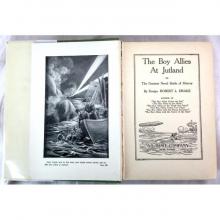 The Boy Allies with the Terror of the Seas; Or, The Last Shot of Submarine D-16
The Boy Allies with the Terror of the Seas; Or, The Last Shot of Submarine D-16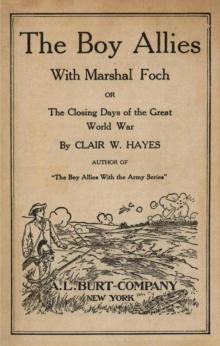 The Boy Allies on the North Sea Patrol
The Boy Allies on the North Sea Patrol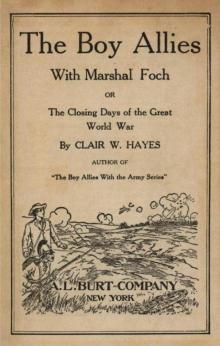 The Boy Allies in the Baltic; Or, Through Fields of Ice to Aid the Czar
The Boy Allies in the Baltic; Or, Through Fields of Ice to Aid the Czar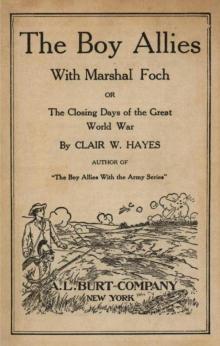 The Boy Allies with Marshal Foch; or, The Closing Days of the Great World War
The Boy Allies with Marshal Foch; or, The Closing Days of the Great World War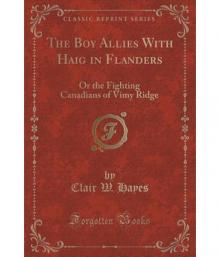 Boy Allies with Haig in Flanders; Or, the Fighting Canadians of Vimy Ridge
Boy Allies with Haig in Flanders; Or, the Fighting Canadians of Vimy Ridge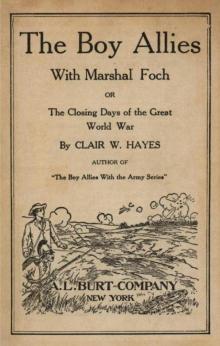 Boy Allies with the Victorious Fleets; Or, The Fall of the German Navy
Boy Allies with the Victorious Fleets; Or, The Fall of the German Navy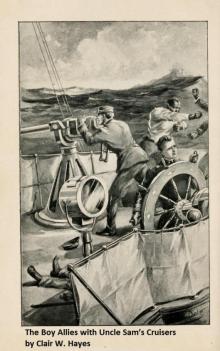 Boy Allies with Uncle Sam's Cruisers
Boy Allies with Uncle Sam's Cruisers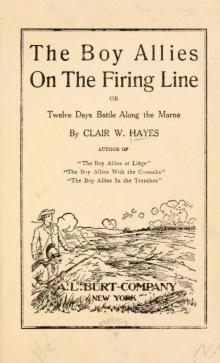 Boy Allies at Liège; Or, Through Lines of Steel
Boy Allies at Liège; Or, Through Lines of Steel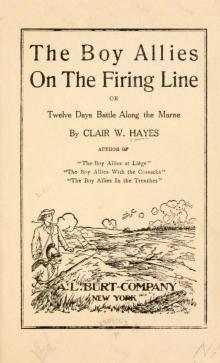 Boy Allies on the Firing Line; Or, Twelve Days Battle Along the Marne
Boy Allies on the Firing Line; Or, Twelve Days Battle Along the Marne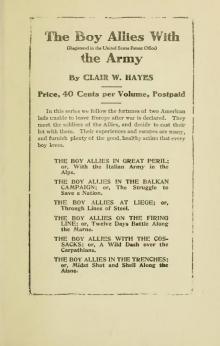 Boy Allies in the Balkan Campaign; Or, the Struggle to Save a Nation
Boy Allies in the Balkan Campaign; Or, the Struggle to Save a Nation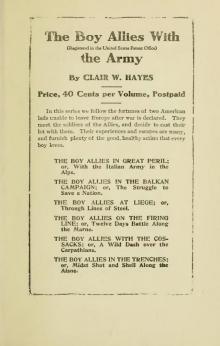 Boy Allies in the Trenches; Or, Midst Shot and Shell Along the Aisne
Boy Allies in the Trenches; Or, Midst Shot and Shell Along the Aisne Boy Artist.
Boy Artist.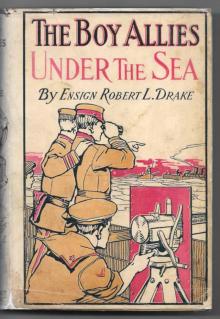 Boy Allies Under the Sea; Or, The Vanishing Submarines
Boy Allies Under the Sea; Or, The Vanishing Submarines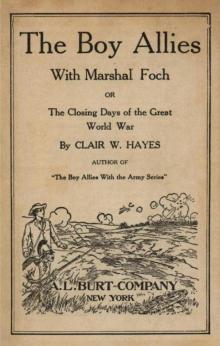 Boy Allies under Two Flags
Boy Allies under Two Flags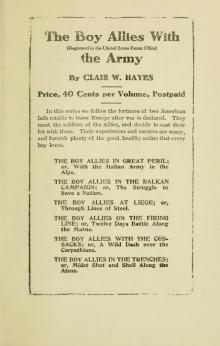 Boy Allies in Great Peril; Or, With the Italian Army in the Alps
Boy Allies in Great Peril; Or, With the Italian Army in the Alps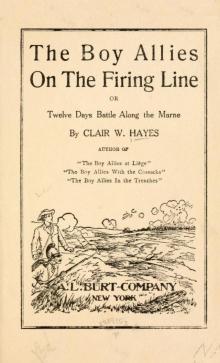 Boy Allies with the Cossacks; Or, A Wild Dash over the Carpathians
Boy Allies with the Cossacks; Or, A Wild Dash over the Carpathians